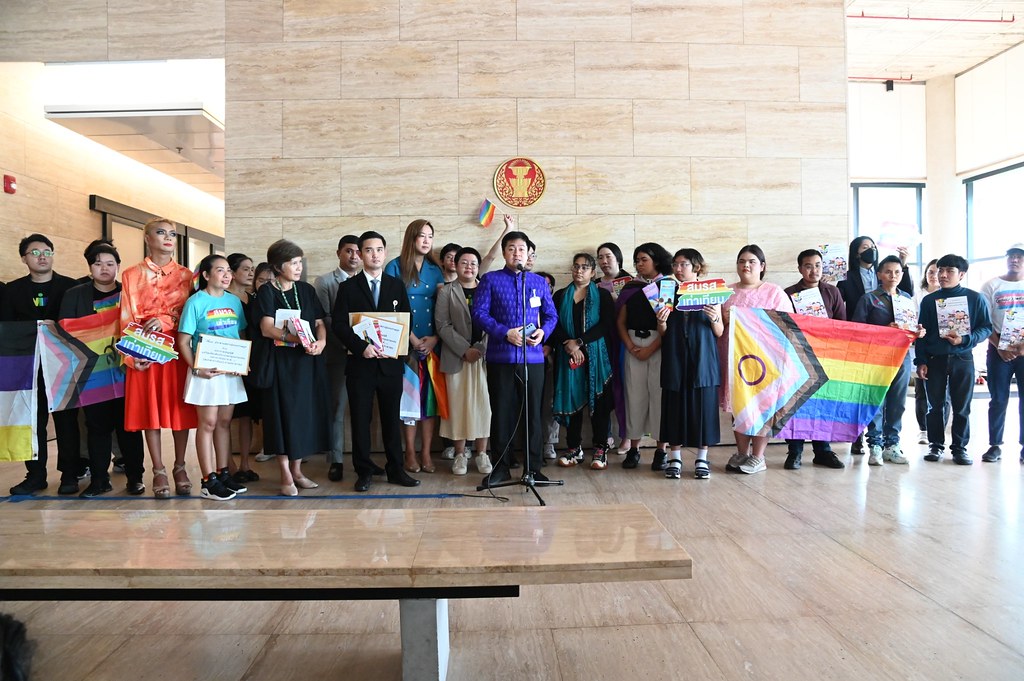A civil society network proposing a new marriage equality bill, a gender recognition bill, and a bill repealing the 1996 Prevention and Suppression of Prostitution Act is poised to launch a campaign to collect signatures to introduce the bills into parliament.

The activists submitted their petition to deputy House Speaker Padipat Suntipada. (Photo from the Secretariat of the House of Representatives)
As required by the 2021 Initiative Process Act, network representatives went to parliament yesterday (28 September) to submit petitions signed by 20 voters for each bill – the first step in their campaign. Parliament must inform them in 15 days whether the bills meet the requirements of legislation that can be proposed by civil groups. Thereafter, a campaign can be launched to collect 10,000 signatures for each bill so that so that the draft legislation can be sent to the House of Representatives.
The three bills were launched together at a press conference on 20 September as part of the “Three Miracle Laws” campaign which aims to promote gender equality and LGBTQ rights.
The three bills are:
- Proposed Amendments to the Civil and Commercial Code bill, or the Marriage Equality bill, to change sections on marriage and family in the Civil and Commercial Code so as to allow marriage registration regardless of gender;
- The Recognition of Gender Identity, Gender Expression, and Sex Characteristic Bill, or “GEN-ACT” for short, which would grant trans, non-binary, and intersex people the right to change gender markers on their official documents to match their identities and allow for the use of the gender neutral marker X/Other; and
- The repeal of the 1996 Prevention and Suppression of Prostitution Act bill, which would legalise sex work and grant sex workers protection under labour laws.
The network said that all three bills aim to secure equal rights for people, regardless of their identity. The hope is to end all forms of discrimination and make sure that everyone is treated equally, regardless of gender identity or occupation.
The network asked parliament to consider the bills, since they are important steps towards justice and equality. They also hope that their campaign will set a valuable precedent - the first time legislation proposed by civil groups is passed into law by parliament.
Deputy House Speaker Padipat Suntipada received the petitions and parliament officials responsible for legislative proposals also came to the press conference room to facilitate the submission process.
Padipat said that parliament now has its own online petition system where voters can express support for bills being proposed by civil groups, speeding up the signature collection process.
He also said he is happy to facilitate the process, and that the House is planning to add an extra day of meeting per week to discuss bills proposed by civil groups. He added that they will not have to wait until everything proposed by the cabinet has been considered and hopes that this will speed up the process of bringing these bills before parliament, where the activists will be able to present the bills themselves.
Prachatai English is an independent, non-profit news outlet committed to covering underreported issues in Thailand, especially about democratization and human rights, despite pressure from the authorities. Your support will ensure that we stay a professional media source and be able to meet the challenges and deliver in-depth reporting.
• Simple steps to support Prachatai English
1. Bank transfer to account “โครงการหนังสือพิมพ์อินเทอร์เน็ต ประชาไท” or “Prachatai Online Newspaper” 091-0-21689-4, Krungthai Bank
2. Or, Transfer money via Paypal, to e-mail address: [email protected], please leave a comment on the transaction as “For Prachatai English”
